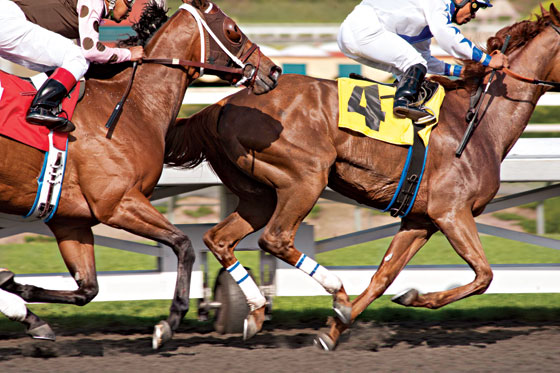
Luck is no Deadwood, nor was it meant to be. But if you stick with Deadwood creator David Milch’s new HBO series about horse racing—buffed to a fine sheen by executive producer and pilot director Michael Mann (Heat, Collateral)—it’s hugely rewarding. Set and shot mostly at the Santa Anita racetrack outside of L.A., it comes on like a seedy comic melodrama about winners and losers who change places because of luck. The opening credits are a kaleidoscope of superstition-laden objects and symbols: a shooting star, coins tumbling into a fountain, a neon shamrock, a tattoo of praying hands. But over the course of several episodes, the show reveals itself as something slipperier and more complicated: a drama that asks if luck even exists and, if so, whether one can understand and harness it. The elasticity of the show’s organizing metaphor is part of what makes it so fascinating.
The pilot starts with entrepreneur-gangster Chester “Ace” Bernstein (Dustin Hoffman, also one of the show’s producers) leaving prison after doing a few years for cocaine possession (the drugs weren’t his). While Ace was in the slammer, he bought a $2 million thoroughbred and registered it under the name of his limo driver and bodyguard, Gus Demitriou (Dennis Farina, star of Mann’s great series Crime Story). Ace and Gus’s relationship has a touch of Don Quixote and Sancho Panza’s; the boss is the visionary, the dreamer with a violent temper, and Gus is the cool cat who reins him in, saving him from others and himself. Over the next few weeks, we find out whom Ace protected by doing the time and what, precisely, he’s after—revenge against the business associates who screwed him, exacted in the form of a stealth takeover of the track. Michael Gambon plays one of those associates, a British billionaire who lives on a yacht. Watching Gambon and Hoffman act together is like watching two old lions circle each other.
Hoffman, Farina, and Gambon are but three names in one of the biggest recurring casts on TV. The arrogant but wizardly trainer Escalante (John Ortiz) handles Ace’s horse and many others, including a growing stable managed by four gambling buddies (Kevin Dunn, Jason Gedrick, Ian Hart, and Ritchie Coster) who have a good run of luck and try to build it into something permanent. Jill Hennessy is Jo, a veterinarian who might have eyes for Escalante. Nick Nolte plays trainer Walter Smith, a shambling old man who seems to feel things more intensely than most people; when he watches a horse win, he bellows his lungs out and tears up. Gary Stevens plays a veteran jockey (and was one in real life), while Tom Payne and Kerry Condon play a pair of riders who are secretly sleeping together even though they’re in direct competition. Richard Kind is a resourceful jockeys’ agent with a stutter that earns him the cruel nickname “Porky Pig.” Vivid minor characters loiter in the margins of Luck, including a security guard who’s running an unofficial loan-sharking business.
Much was made of the friction between Milch and Mann, which devolved into an arrangement under which Milch controlled the scripts and Mann controlled everything else. You can feel the uneasiness in Mann’s pilot, which is slow-paced yet oddly tense. The meditative shots of racetracks at dawn, birds scattering through cloudy skies, and horses’ eyes, ears, and teeth in close-up are very Mannish, but the mix of profane, philosophical banter, old-guys-know-everything monologuing, and out-of-nowhere bursts of tenderness and fellow-feeling are pure Milch. The talk of oddsmaking and pick-sixes and claims may be impenetrable if you don’t spend much time at the track, but don’t let it scare you off; the linguistic details sell the action, but they’re not the whole show. And it’s all a metaphor anyway. Milch’s racetrack is a microcosm of late-capitalist America’s death throes, the dark mirror of Deadwood’s exuberant robber-baron petri dish. The most radical thing about this show is its belief in kind and unselfish behavior as a different type of gambling: a bet on karma, or an investment in the future of the species. There are several sequences in upcoming episodes that are as affecting as anything I’ve seen on television, and they’re all about people caring for other people and showing them the love they’ve been denied. For all his outward hardness, Milch is a cockeyed optimist, Frank Capra with F-words. Do good deeds, Luck seems to say, and you’ll reap rewards tenfold.
See Also:
• Dennis Farina on Playing the Hustler
• A Handy Guide to Understanding HBO’s Luck
Luck
HBO.
Sundays, 9 p.m.
